Latest Sheet Music
Prokofiev

Sergei Sergeyevich Prokofiev (Russian: Сергей Сергеевич Прокофьев; Ukrainian: Сергій Сергійович Прокоф'єв) (27 April 1891 – 5 March 1953) was a Russian composer, pianist and conductor who mastered numerous musical genres and came to be admired as one of the greatest composers of the 20th century.
Prokofiev was a soloist with the London Symphony Orchestra, conducted by Piero Coppola, in the first recording of his Piano Concerto No. 3, recorded in London by His Master's Voice in June 1932. Prokofiev also recorded some of his solo piano music for HMV in Paris in February 1935; these recordings were issued on CD by Pearl and Naxos. In 1938, he conducted the Moscow Philharmonic Orchestra in a recording of the second suite from his Romeo and Juliet ballet; this performance was also later released on LP and CD. Another reported recording with Prokofiev and the Moscow Philharmonic was of the First Violin Concerto with David Oistrakh as soloist; Everest Records later released this recording on an LP.
Prokofiev was a soloist with the London Symphony Orchestra, conducted by Piero Coppola, in the first recording of his Piano Concerto No. 3, recorded in London by His Master's Voice in June 1932. Prokofiev also recorded some of his solo piano music for HMV in Paris in February 1935; these recordings were issued on CD by Pearl and Naxos. In 1938, he conducted the Moscow Philharmonic Orchestra in a recording of the second suite from his Romeo and Juliet ballet; this performance was also later released on LP and CD. Another reported recording with Prokofiev and the Moscow Philharmonic was of the First Violin Concerto with David Oistrakh as soloist; Everest Records later released this recording on an LP.
Shostakovich

Dmitri Dmitriyevich Shostakovich (25 September 1906 – 9 August 1975) was a Soviet Russian composer and one of the most celebrated composers of the 20th century.
Shostakovich achieved fame in the Soviet Union under the patronage of Leon Trotsky's chief of staff Mikhail Tukhachevsky, but later had a complex and difficult relationship with the Stalinist bureaucracy. In 1936, the government, most probably under orders from Stalin, harshly criticized his opera Lady Macbeth of the Mtsensk District, causing him to withdraw the Fourth Symphony during its rehearsal stages. Shostakovich's music was officially denounced twice, in 1936 and 1948, and was periodically banned. Nevertheless, he also received accolades and state awards and served in the Supreme Soviet of the RSFSR. Despite the official controversy, his works were popular and well received.
Shostakovich achieved fame in the Soviet Union under the patronage of Leon Trotsky's chief of staff Mikhail Tukhachevsky, but later had a complex and difficult relationship with the Stalinist bureaucracy. In 1936, the government, most probably under orders from Stalin, harshly criticized his opera Lady Macbeth of the Mtsensk District, causing him to withdraw the Fourth Symphony during its rehearsal stages. Shostakovich's music was officially denounced twice, in 1936 and 1948, and was periodically banned. Nevertheless, he also received accolades and state awards and served in the Supreme Soviet of the RSFSR. Despite the official controversy, his works were popular and well received.
Beethoven

Ludwig van Beethoven (16 December 1770 - 26 March 1827) was a German composer and pianist. He was a crucial figure in the transitional period between the Classical and Romantic eras in Western classical music, and remains one of the most respected and influential composers of all time.
Born in Bonn, then in the Electorate of Cologne (now in modern-day Germany), he moved to Vienna in his early twenties and settled there, studying with Joseph Haydn and quickly gaining a reputation as a virtuoso pianist. Beethoven's hearing gradually deteriorated beginning in his twenties, yet he continued to compose masterpieces, and to conduct and perform, even after he was completely deaf.
Born in Bonn, then in the Electorate of Cologne (now in modern-day Germany), he moved to Vienna in his early twenties and settled there, studying with Joseph Haydn and quickly gaining a reputation as a virtuoso pianist. Beethoven's hearing gradually deteriorated beginning in his twenties, yet he continued to compose masterpieces, and to conduct and perform, even after he was completely deaf.
Luigi Denza
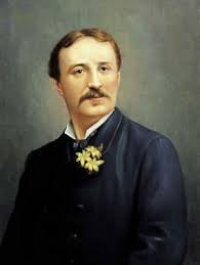
Luigi Denza (24 February 1846 - 26 January 1922), was an Italian composer. Denza was born at Castellammare di Stabia, near Naples. He studied music under Saverio Mercadante and Paolo Serrao at the Naples Conservatory. Later, he moved to London and became a professor of singing at the Royal Academy of Music in 1898. Denza wrote an opera, Wallenstein, and hundreds of songs. The most popular of these was a collaboration with Peppino Turco, the Neapolitan song Funiculì, Funiculà, about the Vesuvius funicular. Other songs such as "Luna fedel", "Occhi di fata", and "Se" have been sung by Mario Lanza, Luciano Pavarotti, Carlo Bergonzi, Enrico Caruso and Ronan Tynan.
Luigi Denza died in 1922 in London.
Luigi Denza died in 1922 in London.
Lars Winnerbäck

Lars Mattias Winnerbäck (born 19 October 1975 in Stockholm) is a Swedish singer and songwriter. He was born in Stockholm but spent his childhood in Vidingsjö, Linköping, where he attended Katedralskolan. He moved back to Stockholm in 1996, the same year he released his first album, Dans med svåra steg. He is now one of Sweden's most popular artists.The influence of songwriters like Carl Michael Bellman, Evert Taube, Bob Dylan, Ulf Lundell and Cornelis Vreeswijk shines through in Winnerbäck's exclusively Swedish lyrics, which deal with shallowness, prejudice in society, as well as romance, relationships and anxiety. Several songs depict the difference between living in small town Linköping and the capital Stockholm.
Bach

Johann Sebastian Bach (31 March 1685 – 28 July 1750) was a German composer and organist whose sacred and secular works for choir, orchestra, and solo instruments drew together the strands of the Baroque period and brought it to its ultimate maturity. Although he introduced no new forms, he enriched the prevailing German style with a robust contrapuntal technique, an unrivalled control of harmonic and motivic organisation in composition for diverse musical forces, and the adaptation of rhythms and textures from abroad, particularly Italy and France.
Revered for their intellectual depth and technical and artistic beauty, Bach's works include the Brandenburg concertos; the Goldberg Variations; the English Suites, French Suites, Partitas, and Well-Tempered Clavier; the Mass in B Minor; the St. Matthew Passion; the St. John Passion; The Musical Offering; The Art of Fugue; the Sonatas and Partitas for violin solo; the Cello Suites; more than 200 surviving cantatas; and a similar number of organ works, including the celebrated Toccata and Fugue in D Minor.
While Bach's fame as an organist was great during his lifetime, he was not particularly well-known as a composer. His adherence to Baroque forms and contrapuntal style was considered "old-fashioned" by his contemporaries, especially late in his career when the musical fashion tended towards Rococo and later Classical styles. A revival of interest and performances of his music began early in the 19th century, and he is now widely considered to be one of the greatest composers in the Western tradition.
Revered for their intellectual depth and technical and artistic beauty, Bach's works include the Brandenburg concertos; the Goldberg Variations; the English Suites, French Suites, Partitas, and Well-Tempered Clavier; the Mass in B Minor; the St. Matthew Passion; the St. John Passion; The Musical Offering; The Art of Fugue; the Sonatas and Partitas for violin solo; the Cello Suites; more than 200 surviving cantatas; and a similar number of organ works, including the celebrated Toccata and Fugue in D Minor.
While Bach's fame as an organist was great during his lifetime, he was not particularly well-known as a composer. His adherence to Baroque forms and contrapuntal style was considered "old-fashioned" by his contemporaries, especially late in his career when the musical fashion tended towards Rococo and later Classical styles. A revival of interest and performances of his music began early in the 19th century, and he is now widely considered to be one of the greatest composers in the Western tradition.
The Platters

The Platters were a successful vocal group of the early rock and roll era. Their distinctive sound was a bridge between the pre-rock Tin Pan Alley tradition, and the burgeoning new genre. The original group members were Alex Hodge, Cornell Gunther, David Lynch, Joe Jefferson, Gaynel Hodge and Herb Reed.
After signing with Buck Ram, the act went through several personnel changes before hitting the charts, with the most successful incarnation comprising lead tenor Tony Williams, David Lynch, Paul Robi, Herb Reed, and Zola Taylor.
After signing with Buck Ram, the act went through several personnel changes before hitting the charts, with the most successful incarnation comprising lead tenor Tony Williams, David Lynch, Paul Robi, Herb Reed, and Zola Taylor.
Carlo Domeniconi
Carlo Domeniconi (born 20 February 1947) is an Italian guitarist and composer. Although his compositions include a wide variety of genres and instrumentation choices, he is best known for his works for solo guitar, and particularly the Koyunbaba suite. Domeniconi's style is characterized by his adoption of multicultural influences. His works explore and borrow from a wide variety of national traditions, including Turkish, Indian, Brazilian, and many more.
Traditional

The Gap Band
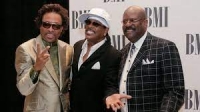
The Gap Band was an American R&B and funk band that rose to fame during the 1970s and 1980s. The band consisted of three brothers: Charlie, Ronnie, and Robert Wilson, along with other members; it was named after streets in the historic Greenwood neighborhood in the brothers' hometown of Tulsa, Oklahoma.
Brahms

Johannes Brahms (May 7, 1833 â April 3, 1897) was a German composer of the Romantic period. He was born in Hamburg and in his later years he settled in Vienna, Austria.
Brahms maintained a Classical sense of form and order in his works â in contrast to the opulence of the music of many of his contemporaries. Thus many admirers (though not necessarily Brahms himself) saw him as the champion of traditional forms and "pure music," as opposed to the New German embrace of program music.
Brahms venerated Beethoven: in the composer's home, a marble bust of Beethoven looked down on the spot where he composed, and some passages in his works are reminiscent of Beethoven's style. The main theme of the finale of Brahms's First Symphony is reminiscent of the main theme of the finale of Beethoven's Ninth, and when this resemblance was pointed out to Brahms he replied that any ass â jeder Esel â could see that.
Ein deutsches Requiem was partially inspired by his mother's death in 1865, but also incorporates material from a Symphony he started in 1854, but abandoned following Schumann's suicide attempt. He once wrote that the Requiem "belonged to Schumann". The first movement of this abandoned Symphony was re-worked as the first movement of the First Piano Concerto.
Brahms also loved the Classical composers Mozart and Haydn. He collected first editions and autographs of their works, and edited performing editions. He also studied the music of pre-classical composers, including Giovanni Gabrieli, Johann Adolph Hasse, Heinrich Schütz and especially Johann Sebastian Bach. His friends included leading musicologists, and with Friedrich Chrysander he edited an edition of the works of François Couperin. He looked to older music for inspiration in the arts of strict counterpoint; the themes of some of his works are modelled on Baroque sources, such as Bach's The Art of Fugue in the fugal finale of Cello Sonata No. 1, or the same composer's Cantata No. 150 in the passacaglia theme of the Fourth Symphony's finale.
Brahms maintained a Classical sense of form and order in his works â in contrast to the opulence of the music of many of his contemporaries. Thus many admirers (though not necessarily Brahms himself) saw him as the champion of traditional forms and "pure music," as opposed to the New German embrace of program music.
Brahms venerated Beethoven: in the composer's home, a marble bust of Beethoven looked down on the spot where he composed, and some passages in his works are reminiscent of Beethoven's style. The main theme of the finale of Brahms's First Symphony is reminiscent of the main theme of the finale of Beethoven's Ninth, and when this resemblance was pointed out to Brahms he replied that any ass â jeder Esel â could see that.
Ein deutsches Requiem was partially inspired by his mother's death in 1865, but also incorporates material from a Symphony he started in 1854, but abandoned following Schumann's suicide attempt. He once wrote that the Requiem "belonged to Schumann". The first movement of this abandoned Symphony was re-worked as the first movement of the First Piano Concerto.
Brahms also loved the Classical composers Mozart and Haydn. He collected first editions and autographs of their works, and edited performing editions. He also studied the music of pre-classical composers, including Giovanni Gabrieli, Johann Adolph Hasse, Heinrich Schütz and especially Johann Sebastian Bach. His friends included leading musicologists, and with Friedrich Chrysander he edited an edition of the works of François Couperin. He looked to older music for inspiration in the arts of strict counterpoint; the themes of some of his works are modelled on Baroque sources, such as Bach's The Art of Fugue in the fugal finale of Cello Sonata No. 1, or the same composer's Cantata No. 150 in the passacaglia theme of the Fourth Symphony's finale.
Harry Warren

Harry Warren (born Salvatore Antonio Guaragna, December 24, 1893 – September 22, 1981) was an American composer and lyricist. Warren was the first major American songwriter to write primarily for film. He was nominated for the Academy Award for Best Original Song eleven times and won three Oscars for composing "Lullaby of Broadway", "You'll Never Know" and "On the Atchison, Topeka and the Santa Fe". He wrote the music for the first blockbuster film musical, 42nd Street, choreographed by Busby Berkeley, with whom he would collaborate on many musical films.
Debussy

Achille-Claude Debussy (August 22, 1862 – March 25, 1918) was a French composer. Along with Maurice Ravel, he is considered one of the most prominent figures working within the field of Impressionist music, though he himself intensely disliked the term when applied to his compositions. Debussy was not only among the most important of all French composers but also was a central figure in all European music at the turn of the twentieth century.
Debussy's music virtually defines the transition from late-Romantic music to twentieth century modernist music. In French literary circles, the style of this period was known as Symbolism, a movement that directly inspired Debussy both as a composer and as an active cultural participant.
Debussy's music virtually defines the transition from late-Romantic music to twentieth century modernist music. In French literary circles, the style of this period was known as Symbolism, a movement that directly inspired Debussy both as a composer and as an active cultural participant.
Haroldo Lobo
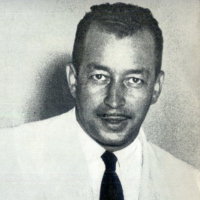
Haroldo Lobo (Rio de Janeiro, 22 de julho de 1910 — Rio de Janeiro, 20 de julho de 1965) foi um compositor brasileiro.
Buster Poindexter
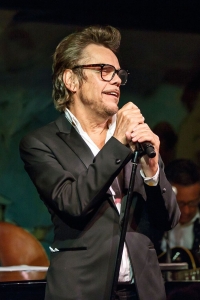
David Roger Johansen (sometimes spelled David Jo Hansen; born January 9, 1950) is an American singer, songwriter and actor. He is best known as a member of the seminal proto-punk band the New York Dolls. He is also known for his work under the pseudonym Buster Poindexter, and for playing the Ghost of Christmas Past in Scrooged.
Faith Hill

Audrey Faith Perry McGraw, known professionally as Faith Hill (born September 21, 1967), is an American country and pop singer, known both for her commercial success and her marriage to fellow country star Tim McGraw. Hill's voice (described as both soulful and raspy) and careful song selection have helped her to sell more than 35 million records and accumulate eleven number-one singles on the Country charts.
Hill has been honored by the Country Music Association, the Academy of Country Music, the Grammy Awards, the American Music Awards and the People's Choice Awards. Her Soul2Soul II Tour 2006 with husband McGraw became the highest-grossing country tour of all time. In 2001 she was named one of the "30 Most Powerful Women in America" by Ladies Home Journal.
Hill has been honored by the Country Music Association, the Academy of Country Music, the Grammy Awards, the American Music Awards and the People's Choice Awards. Her Soul2Soul II Tour 2006 with husband McGraw became the highest-grossing country tour of all time. In 2001 she was named one of the "30 Most Powerful Women in America" by Ladies Home Journal.
Chopin

Frédéric Chopin (1 March 1810 – 17 October 1849) was a Polish composer and virtuoso pianist of the Romantic period. He is widely regarded as the greatest Polish composer, and ranks as one of music's greatest tone poets.
He was born in the village of Żelazowa Wola, in the Duchy of Warsaw, to a Polish mother and French-expatriate father, and in his early life was regarded as a child-prodigy pianist. In November 1830, at the age of 20, Chopin went abroad; following the suppression of the Polish November Uprising of 1830–31, he became one of many expatriates of the Polish "Great Emigration."
In Paris, he made a comfortable living as a composer and piano teacher, while giving few public performances. A Polish patriot,
Chopin's extant compositions were written primarily for the piano as a solo instrument. Though technically demanding, Chopin's style emphasizes nuance and expressive depth rather than virtuosity. Chopin invented musical forms such as the ballade and was responsible for major innovations in forms such as the piano sonata, waltz, nocturne, étude, impromptu and prelude. His works are mainstays of Romanticism in 19th-century classical music.
He was born in the village of Żelazowa Wola, in the Duchy of Warsaw, to a Polish mother and French-expatriate father, and in his early life was regarded as a child-prodigy pianist. In November 1830, at the age of 20, Chopin went abroad; following the suppression of the Polish November Uprising of 1830–31, he became one of many expatriates of the Polish "Great Emigration."
In Paris, he made a comfortable living as a composer and piano teacher, while giving few public performances. A Polish patriot,
Chopin's extant compositions were written primarily for the piano as a solo instrument. Though technically demanding, Chopin's style emphasizes nuance and expressive depth rather than virtuosity. Chopin invented musical forms such as the ballade and was responsible for major innovations in forms such as the piano sonata, waltz, nocturne, étude, impromptu and prelude. His works are mainstays of Romanticism in 19th-century classical music.
Pietro Domenico Paradies

Pietro Domenico Paradies, was an Italian composer, harpsichordist and harpsichord teacher, most prominently known for a composition popularly entitled "Toccata in A", which is, in other sources, the second movement of his Sonata No. 6
Darrell Evans
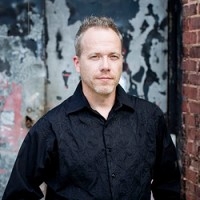
Darrell Patton Evans (born October 6, 1968) is an American evangelical Christian musician and songwriter, known primarily for his contributions to contemporary Christian worship. Influenced by the music of Bruce Springsteen and U2, his style of music is noted for its extensive use of free form composition, with several of his songs having been written spontaneously during concerts and worship times. Besides his music writing, he is an accomplished guitar player and singer.
Hans-Joachim Eißler
Hans-Joachim Eißler ... is a seminar speaker and coach at musikplus - popular music in the EJW. musikplus offers a variety.
Arnold Zamora

Arnold Escobilla Zamora (born February 10 , 1961 ) is a Filipino musician known in the national music industry as a singer , composer , arranger and conductor.
Cory Hart
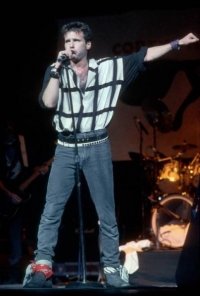
Corey Mitchell Hart (born 31 May 1962) is a Grammy Award-nominated Canadian musician.
Hart's first album was recorded in Manchester, England in the spring of 1982. Released in 1983, First Offense, featured the US Top 10 hit songs "Sunglasses at Night" and "It Ain't Enough". The album went platinum in both Canada and the United States.
His follow-up album was the chart-topping Boy in the Box. Boy in the Box reached diamond status in Canada (one million copies sold), becoming only the second Canadian album to do so, after Bryan Adams' Reckless that same year. It featured the radio hit "Never Surrender," which was the #2 song in the year-end Canadian charts in 1985, finishing second only to "Tears Are Not Enough," the Northern Lights charity single which also featured Hart.
Hart recorded songs even after his commercial success in the United States began to wane. However, he continued to be successful in Canada throughout the 1990s. He amassed 26 Top 30 hits in his native country.
In 2002, Hart returned to the studio to re-record "Sunglasses At Night," which was remixed by engineers, Original 3. Released to club DJs that year, it became an instant smash on the international dance music charts.
Hart's first album was recorded in Manchester, England in the spring of 1982. Released in 1983, First Offense, featured the US Top 10 hit songs "Sunglasses at Night" and "It Ain't Enough". The album went platinum in both Canada and the United States.
His follow-up album was the chart-topping Boy in the Box. Boy in the Box reached diamond status in Canada (one million copies sold), becoming only the second Canadian album to do so, after Bryan Adams' Reckless that same year. It featured the radio hit "Never Surrender," which was the #2 song in the year-end Canadian charts in 1985, finishing second only to "Tears Are Not Enough," the Northern Lights charity single which also featured Hart.
Hart recorded songs even after his commercial success in the United States began to wane. However, he continued to be successful in Canada throughout the 1990s. He amassed 26 Top 30 hits in his native country.
In 2002, Hart returned to the studio to re-record "Sunglasses At Night," which was remixed by engineers, Original 3. Released to club DJs that year, it became an instant smash on the international dance music charts.
John Williams

John Towner Williams (born February 8, 1932) is an American composer, conductor, and pianist. In a career that spans six decades, Williams has composed many of the most famous film scores in Hollywood history, including Star Wars, Superman, Home Alone, the first three Harry Potter movies and all but two of Steven Spielberg's feature films including the Indiana Jones series, Schindler's List, E.T. the Extra-Terrestrial, Jurassic Park and Jaws. He also composed the soundtrack for the hit 1960s television series Lost in Space as well as the fanfare of the DreamWorks Pictures' logo.
Williams has composed theme music for four Olympic Games, the NBC Nightly News, the rededication of the Statue of Liberty, and numerous television series and concert pieces. He served as the principal conductor of the Boston Pops Orchestra from 1980 to 1993, and is now the orchestra's laureate conductor.
Williams is a five-time winner of the Academy Award. He has also won four Golden Globe Awards, seven BAFTA Awards and 21 Grammy Awards. With 45 Academy Award nominations, Williams is, together with composer Alfred Newman, the second most nominated person after Walt Disney. He was inducted into the Hollywood Bowl Hall of Fame in 2000, and was a recipient of the Kennedy Center Honors in 2004.
Williams has composed theme music for four Olympic Games, the NBC Nightly News, the rededication of the Statue of Liberty, and numerous television series and concert pieces. He served as the principal conductor of the Boston Pops Orchestra from 1980 to 1993, and is now the orchestra's laureate conductor.
Williams is a five-time winner of the Academy Award. He has also won four Golden Globe Awards, seven BAFTA Awards and 21 Grammy Awards. With 45 Academy Award nominations, Williams is, together with composer Alfred Newman, the second most nominated person after Walt Disney. He was inducted into the Hollywood Bowl Hall of Fame in 2000, and was a recipient of the Kennedy Center Honors in 2004.
Orlande de Lassus

Orlande de Lassus (also Roland de Lassus, Orlando di Lasso, Orlandus Lassus, Orlande de Lattre or Roland de Lattre; 1532, possibly 1530 – 14 June 1594) was a composer of the late Renaissance, chief representative of the mature polyphonic style of the Franco-Flemish school, and considered to be one of the three most famous and influential musicians in Europe at the end of the 16th century (the other two being Palestrina and Victoria).
Peter Allen Greenbaum
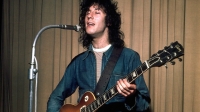
(29 October 1946 – 25 July 2020), known professionally as Peter Green, was an English blues rock singer-songwriter and guitarist. As the founder of Fleetwood Mac, he was inducted into the Rock and Roll Hall of Fame in 1998. Green's songs, such as "Albatross", "Black Magic Woman", "Oh Well", "The Green Manalishi (With the Two Prong Crown)" and "Man of the World", appeared on singles charts, and several have been adapted by a variety of musicians.
Leonhard von Call
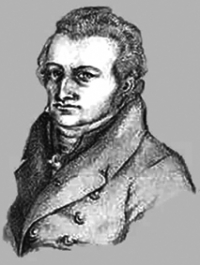
Leonhard von Call (19 March 1767 – 19 February 1815), sometimes referred to as "Leonhard de Call", was an Austrian composer and virtuoso on the mandolin and guitar. During his lifetime he focused less on performing and more upon teaching and writing music for others to play. A virtuoso, he wrote not for other virtuosos but for the people he was teaching or amateurs, and today it is felt by some musicians that his works "made no great technical demands".[
Don McLean

Donald McLean (born October 2, 1945 in New Rochelle, New York) is an American singer-songwriter. He is most famous for his 1971 album American Pie, containing the renowned songs American Pie and Vincent.
The McLean clan traces its roots to the Isle of Iona in the Scottish Hebrides. Both Don’s grandfather and father were named Donald McLean which sometimes led to confusion as Don was also christened Donald McLean. Don’s mother’s family, the Buccis, came from Abruzzi in southern Italy. They left Italy and settled in Port Chester, N.Y. at the end of the 19th century.
The McLean clan traces its roots to the Isle of Iona in the Scottish Hebrides. Both Don’s grandfather and father were named Donald McLean which sometimes led to confusion as Don was also christened Donald McLean. Don’s mother’s family, the Buccis, came from Abruzzi in southern Italy. They left Italy and settled in Port Chester, N.Y. at the end of the 19th century.
Leonard Cohen

Leonard Norman Cohen, CC, GOQ (born September 21, 1934) is a Canadian singer-songwriter, musician, poet and novelist. Cohen published his first book of poetry in Montreal in 1956 and his first novel in 1963. His work often deals with the exploration of religion, isolation, sexuality and complex interpersonal relationships. Famously reclusive, spending years in a Zen Buddhist monastery, and possessing a persona frequently associated with mystique, he is extremely well-regarded by critics for his literary accomplishments and for producing an output of work of high artistic quality over a five-decade career.
Musically, Cohen's earliest songs (many of which appeared on the 1967 album, Songs of Leonard Cohen) were rooted in European folk music. In the 1970s, his material encompassed pop, cabaret and world music. Since the 1980s his high baritone voice has evolved into lower registers (bass baritone and bass), with accompaniment from a wide variety of instruments and female backing singers.
Over 2,000 renditions of Cohen's songs have been recorded. Cohen has been inducted into both the Canadian Music Hall of Fame and the Canadian Songwriters Hall of Fame and is also a Companion of the Order of Canada, the nation's highest civilian honour. While giving the speech at Cohen's induction into the American Rock and Roll Hall of Fame on March 10, 2008, Lou Reed described Cohen as belonging to the "highest and most influential echelon of songwriters".
Musically, Cohen's earliest songs (many of which appeared on the 1967 album, Songs of Leonard Cohen) were rooted in European folk music. In the 1970s, his material encompassed pop, cabaret and world music. Since the 1980s his high baritone voice has evolved into lower registers (bass baritone and bass), with accompaniment from a wide variety of instruments and female backing singers.
Over 2,000 renditions of Cohen's songs have been recorded. Cohen has been inducted into both the Canadian Music Hall of Fame and the Canadian Songwriters Hall of Fame and is also a Companion of the Order of Canada, the nation's highest civilian honour. While giving the speech at Cohen's induction into the American Rock and Roll Hall of Fame on March 10, 2008, Lou Reed described Cohen as belonging to the "highest and most influential echelon of songwriters".
Mozart

Wolfgang Amadeus Mozart, full name Johann Chrysostom Wolfgang Amadeus Mozart (27 January 1756 â 5 December 1791) was a prolific and influential composer of the Classical era. His over 600 compositions include works widely acknowledged as pinnacles of symphonic, concertante, chamber, piano, operatic, and choral music. Mozart is among the most enduringly popular of classical composers, and many of his works are part of the standard concert repertoire.
Mozart's music, like Haydn's, stands as an archetypal example of the Classical style. His works spanned the period during which that style transformed from one exemplified by the style galant to one that began to incorporate some of the contrapuntal complexities of the late Baroque, complexities against which the galant style had been a reaction. Mozart's own stylistic development closely paralleled the development of the classical style as a whole. In addition, he was a versatile composer and wrote in almost every major genre, including symphony, opera, the solo concerto, chamber music including string quartet and string quintet, and the piano sonata. While none of these genres were new, the piano concerto was almost single-handedly developed and popularized by Mozart. He also wrote a great deal of religious music, including masses; and he composed many dances, divertimenti, serenades, and other forms of light entertainment.
The central traits of the classical style can be identified in Mozart's music. Clarity, balance, and transparency are hallmarks of his work.
Mozart's music, like Haydn's, stands as an archetypal example of the Classical style. His works spanned the period during which that style transformed from one exemplified by the style galant to one that began to incorporate some of the contrapuntal complexities of the late Baroque, complexities against which the galant style had been a reaction. Mozart's own stylistic development closely paralleled the development of the classical style as a whole. In addition, he was a versatile composer and wrote in almost every major genre, including symphony, opera, the solo concerto, chamber music including string quartet and string quintet, and the piano sonata. While none of these genres were new, the piano concerto was almost single-handedly developed and popularized by Mozart. He also wrote a great deal of religious music, including masses; and he composed many dances, divertimenti, serenades, and other forms of light entertainment.
The central traits of the classical style can be identified in Mozart's music. Clarity, balance, and transparency are hallmarks of his work.
David Plüss
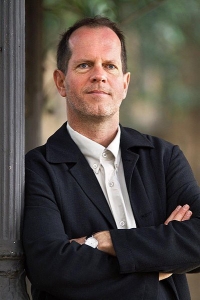
David Plüss Pianist Born: 1957 (age 65 years) Albums: durchbruch, Jahreszeiten, ... und es ward Abend und Morgen, Pianissimo Songs Tanz der Schneeflocken Jahreszeiten · 1989 Winterstille Jahreszeiten · 1989 Ruhet wohl durchbruch · 1988
Matthias Krüger
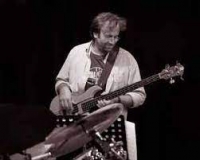
Composer Matthias Krüger is composer for contemporary music and was born in Ulm and grew up in Brussels and Trier. He studied music composition at Cologne’s Hochschule für Musik und Tanz, at Columbia University in New York City, as well as French language in Cologne and Sorbonne University in Paris. Furthermore he participated in the 2021/22 Cursus for Composition and Computer Music at IRCAM in Paris. He is currently a doctoral candidate at Hamburg's University of Music and Theatre. His principal composition teachers include Krzysztof Meyer, Fabien Lévy and Johannes Schöllhorn. He attended festivals such as the Darmstadt International Summer Courses for New Music 2010 and impuls Academy 2011 in Graz and drawn inspiration from master classes and personal encounters with composers like Hans Abrahamsen, Mark André, Georges Aperghis, Chaya Czernowin, Georg Friedrich Haas, Pierre Jodlowski, Sarah Nemtsov, José-María Sánchez-Verdú and Vladimir Tarnopolski as well as the Composition Seminar of New York University with Nils Vigeland.
Sting
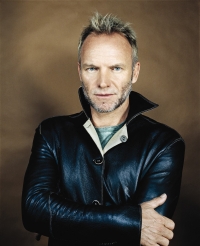
Gordon Matthew Thomas Sumner, CBE (born October 2, 1951), better known by his stage name Sting, is a three time Academy Award-nominated and multiple Grammy-winning English musician from Wallsend in North Tyneside. Prior to starting his solo career, he was the principal songwriter, lead singer and bassist of the rock band The Police. As a solo musician and member of The Police, Sting has sold over 100 million records, and received over sixteen Grammy Awards for his work, receiving his first Grammy for Best Rock Instrumental Performance in 1981, and receiving an Oscar nomination for best song.
Sting has stated that he gained his nickname while with the Phoenix Jazzmen. He once performed wearing a black and yellow sweater with hooped stripes that bandleader Gordon Solomon had noted made him look like a bumblebee; thus Sumner became "Sting". He uses Sting almost exclusively, except on official documents. In a press conference filmed in the movie Bring on the Night, he jokingly stated when referred to by a journalist as Gordon, "My children call me Sting, my mother calls me Sting, who is this Gordon character?"
Sting has stated that he gained his nickname while with the Phoenix Jazzmen. He once performed wearing a black and yellow sweater with hooped stripes that bandleader Gordon Solomon had noted made him look like a bumblebee; thus Sumner became "Sting". He uses Sting almost exclusively, except on official documents. In a press conference filmed in the movie Bring on the Night, he jokingly stated when referred to by a journalist as Gordon, "My children call me Sting, my mother calls me Sting, who is this Gordon character?"
Andrew Lloyd Webber

Andrew Lloyd Webber, Baron Lloyd-Webber (born 22 March 1948) is an English composer of musical theatre, the elder son of organist William Lloyd Webber and brother of the cellist Julian Lloyd Webber. Lloyd Webber started composing at the age of six, and published his first piece at the age of nine.
Lloyd Webber has achieved great popular success, with several musicals that have run for more than a decade both in the West End and on Broadway. He has composed 13 musicals, a song cycle, a set of variations, two film scores, and a Latin Requiem Mass. He has also gained a number of honours, including a knighthood in 1992, followed by a peerage from the British Government for services to Music, seven Tony Awards (and 40 nominations), three Grammy Awards (with an additional 60 nominations), an Academy Award (two other nominations), seven Olivier Awards (with 100 nominations), a Golden Globe, and the Kennedy Center Honors in 2006. Several of his songs, notably "The Music of the Night" from The Phantom of the Opera, "I Don't Know How to Love Him" from Jesus Christ Superstar, "Don't Cry for Me, Argentina" from Evita, "Any Dream Will Do" from Joseph and the Amazing Technicolor Dreamcoat and "Memory" from Cats have been widely recorded and were hits outside of their parent musicals. His company, the Really Useful Group, is one of the largest theatre operators in London.
Producers in several parts of the UK have staged productions, including national tours, of Lloyd Webber's musicals under licence from the Really Useful Group. According to britishhitsongwriters.com, he is the one hundredth most successful songwriter in U.K. singles chart history, based on weeks that his compositions have spent on the chart.
Lloyd Webber has achieved great popular success, with several musicals that have run for more than a decade both in the West End and on Broadway. He has composed 13 musicals, a song cycle, a set of variations, two film scores, and a Latin Requiem Mass. He has also gained a number of honours, including a knighthood in 1992, followed by a peerage from the British Government for services to Music, seven Tony Awards (and 40 nominations), three Grammy Awards (with an additional 60 nominations), an Academy Award (two other nominations), seven Olivier Awards (with 100 nominations), a Golden Globe, and the Kennedy Center Honors in 2006. Several of his songs, notably "The Music of the Night" from The Phantom of the Opera, "I Don't Know How to Love Him" from Jesus Christ Superstar, "Don't Cry for Me, Argentina" from Evita, "Any Dream Will Do" from Joseph and the Amazing Technicolor Dreamcoat and "Memory" from Cats have been widely recorded and were hits outside of their parent musicals. His company, the Really Useful Group, is one of the largest theatre operators in London.
Producers in several parts of the UK have staged productions, including national tours, of Lloyd Webber's musicals under licence from the Really Useful Group. According to britishhitsongwriters.com, he is the one hundredth most successful songwriter in U.K. singles chart history, based on weeks that his compositions have spent on the chart.
Jerome Kern

Jerome David Kern (January 27, 1885 – November 11, 1945) was an American composer of musical theatre and popular music. One of the most important American theatre composers of the early 20th century, he wrote more than 700 songs, used in over 100 stage works, including such classics as "Ol' Man River", "Can't Help Lovin' Dat Man", "A Fine Romance", "Smoke Gets in Your Eyes", "All the Things You Are", "The Way You Look Tonight", "Long Ago (and Far Away)" and "Who?". He collaborated with many of the leading librettists and lyricists of his era, including George Grossmith Jr., Guy Bolton, P. G. Wodehouse, Otto Harbach, Oscar Hammerstein II, Dorothy Fields, Johnny Mercer, Ira Gershwin and E. Y. Harburg.
A native New Yorker, Kern created dozens of Broadway musicals and Hollywood films in a career that lasted for more than four decades. His musical innovations, such as 4/4 dance rhythms and the employment of syncopation and jazz progressions, built on, rather than rejected, earlier musical theatre tradition. He and his collaborators also employed his melodies to further the action or develop characterization to a greater extent than in the other musicals of his day, creating the model for later musicals. Although dozens of Kern's musicals and musical films were hits, only Show Boat is now regularly revived. Songs from his other shows, however, are still frequently performed and adapted. Although Kern detested jazz arrangements of his songs, many have been adopted by jazz musicians to become standard tunes.
A native New Yorker, Kern created dozens of Broadway musicals and Hollywood films in a career that lasted for more than four decades. His musical innovations, such as 4/4 dance rhythms and the employment of syncopation and jazz progressions, built on, rather than rejected, earlier musical theatre tradition. He and his collaborators also employed his melodies to further the action or develop characterization to a greater extent than in the other musicals of his day, creating the model for later musicals. Although dozens of Kern's musicals and musical films were hits, only Show Boat is now regularly revived. Songs from his other shows, however, are still frequently performed and adapted. Although Kern detested jazz arrangements of his songs, many have been adopted by jazz musicians to become standard tunes.
Handel

George Frideric Handel (Friday, 23 February 1685 - Saturday, 14 April 1759) was a German-born Baroque composer who is famous for his operas, oratorios and concerti grossi. Born as Georg Friedrich Handel in Halle, he spent most of his adult life in England, becoming a subject of the British crown on 22 January 1727. His most famous works are Messiah, an oratorio set to texts from the King James Bible; Water Music; and Music for the Royal Fireworks. Strongly influenced by the techniques of the great composers of the Italian Baroque and the English composer Henry Purcell, his music was known to many significant composers who came after him, including Haydn, Mozart, and Beethoven.
Handel's compositions include 42 operas; 29 oratorios; more than 120 cantatas, trios and duets; numerous arias; chamber music; a large number of ecumenical pieces; odes and serenatas; and sixteen organ concerti. His most famous work, the Messiah oratorio with its "Hallelujah" chorus, is among the most popular works in choral music and has become a centerpiece of the Christmas season. Also popular are the Opus 3 and 6 Concerti Grossi, as well as "The Cuckoo and the Nightingale", in which birds are heard calling during passages played in different keys representing the vocal ranges of two birds. Also notable are his sixteen keyboard suites, especially The Harmonious Blacksmith.
Handel introduced various previously uncommon musical instruments in his works: the viola d'amore and violetta marina (Orlando), the lute (Ode for St. Cecilia's Day), three trombones (Saul), clarinets or small high cornets (Tamerlano), theorbo, French horn (Water Music), lyrichord, double bassoon, viola da gamba, bell chimes, positive organ, and harp (Giulio Cesare, Alexander's Feast).
Handel's compositions include 42 operas; 29 oratorios; more than 120 cantatas, trios and duets; numerous arias; chamber music; a large number of ecumenical pieces; odes and serenatas; and sixteen organ concerti. His most famous work, the Messiah oratorio with its "Hallelujah" chorus, is among the most popular works in choral music and has become a centerpiece of the Christmas season. Also popular are the Opus 3 and 6 Concerti Grossi, as well as "The Cuckoo and the Nightingale", in which birds are heard calling during passages played in different keys representing the vocal ranges of two birds. Also notable are his sixteen keyboard suites, especially The Harmonious Blacksmith.
Handel introduced various previously uncommon musical instruments in his works: the viola d'amore and violetta marina (Orlando), the lute (Ode for St. Cecilia's Day), three trombones (Saul), clarinets or small high cornets (Tamerlano), theorbo, French horn (Water Music), lyrichord, double bassoon, viola da gamba, bell chimes, positive organ, and harp (Giulio Cesare, Alexander's Feast).
Ronnie Van Zant
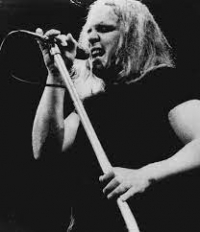
Ronald Wayne Van Zant was an American singer, best known as the original lead vocalist, primary lyricist and a founding member of the southern rock band Lynyrd Skynyrd.
Wicked

Wicked is a musical with songs and lyrics by Stephen Schwartz and a book by Winnie Holzman. The story is based on the best-selling novel Wicked: The Life and Times of the Wicked Witch of the West by Gregory Maguire, a parallel novel of L. Frank Baum's classic story The Wonderful Wizard of Oz from the perspective of the witches of the Land of Oz.
Wicked tells the story of Elphaba, the future Wicked Witch of the West and her relationship with Glinda, the Good Witch of the North. Their friendship struggles through their opposing personalities and viewpoints, rivalry over the same love-interest, their reactions to the Wizard's corrupt government, and, ultimately, Elphaba's public fall from grace. The plot is set mostly before Dorothy's arrival from Kansas, and includes several references to well-known scenes and dialogue in the 1939 film The Wizard of Oz.
The musical debuted on Broadway on October 30, 2003. It is produced by Universal Pictures and directed by Joe Mantello, with musical staging by Wayne Cilento. Its original stars were Idina Menzel as Elphaba, Kristin Chenoweth as Glinda, and Joel Grey as the Wizard. Although the production received mixed reviews and was panned by The New York Times, it has proved to be a favorite among patrons. The Broadway production's success spawned productions in Chicago, Los Angeles, London's West End, Tokyo, Melbourne, and Stuttgart, along with two North American tours that have visited over 30 cities in Canada and the United States.
The score of Wicked is heavily thematic, bearing in some senses more resemblance to a film score than a musical's score. While many musicals' scores develop new motifs and melodies for each song with little overlap, Schwartz integrated a handful of leitmotifs throughout the production. A cast recording of the original Broadway production was released on December 16, 2003, by Universal Music. All of the songs featured on stage are present on the recording with the exception of "The Wizard And I (Reprise)" and "The Wicked Witch of the East". The short reprise of "No One Mourns The Wicked" that opens Act II is attached to the beginning of "Thank Goodness". The music was arranged by Stephen Oremus, who was also the conductor and director, and James Lynn Abbott, with orchestrations by William David Brohn. The recording received the Grammy Award for Best Musical Show Album in 2005 and was certified platinum by the RIAA on November 30, 2006.
Wicked tells the story of Elphaba, the future Wicked Witch of the West and her relationship with Glinda, the Good Witch of the North. Their friendship struggles through their opposing personalities and viewpoints, rivalry over the same love-interest, their reactions to the Wizard's corrupt government, and, ultimately, Elphaba's public fall from grace. The plot is set mostly before Dorothy's arrival from Kansas, and includes several references to well-known scenes and dialogue in the 1939 film The Wizard of Oz.
The musical debuted on Broadway on October 30, 2003. It is produced by Universal Pictures and directed by Joe Mantello, with musical staging by Wayne Cilento. Its original stars were Idina Menzel as Elphaba, Kristin Chenoweth as Glinda, and Joel Grey as the Wizard. Although the production received mixed reviews and was panned by The New York Times, it has proved to be a favorite among patrons. The Broadway production's success spawned productions in Chicago, Los Angeles, London's West End, Tokyo, Melbourne, and Stuttgart, along with two North American tours that have visited over 30 cities in Canada and the United States.
The score of Wicked is heavily thematic, bearing in some senses more resemblance to a film score than a musical's score. While many musicals' scores develop new motifs and melodies for each song with little overlap, Schwartz integrated a handful of leitmotifs throughout the production. A cast recording of the original Broadway production was released on December 16, 2003, by Universal Music. All of the songs featured on stage are present on the recording with the exception of "The Wizard And I (Reprise)" and "The Wicked Witch of the East". The short reprise of "No One Mourns The Wicked" that opens Act II is attached to the beginning of "Thank Goodness". The music was arranged by Stephen Oremus, who was also the conductor and director, and James Lynn Abbott, with orchestrations by William David Brohn. The recording received the Grammy Award for Best Musical Show Album in 2005 and was certified platinum by the RIAA on November 30, 2006.
James Horner

James Roy Horner (born August 14, 1953) is an award winning American composer, orchestrator and conductor of orchestral and film music. He is noted for the integration of choral and electronic elements in many of his film scores, and for frequent use of Celtic musical elements.
In a career that spans over three decades, Horner has composed several of Hollywood's most famous film scores. He is probably best known for his critically acclaimed works on the 1997 film Titanic, which remains today the best selling film soundtrack of all time. Other popular works include Braveheart, Apollo 13, The Mask of Zorro, and The Legend of Zorro.
Horner is a two time Academy Award winner, and has received a total of 11 nominations. He has won numerous other awards, including the Golden Globe Award and the Grammy Award.
In a career that spans over three decades, Horner has composed several of Hollywood's most famous film scores. He is probably best known for his critically acclaimed works on the 1997 film Titanic, which remains today the best selling film soundtrack of all time. Other popular works include Braveheart, Apollo 13, The Mask of Zorro, and The Legend of Zorro.
Horner is a two time Academy Award winner, and has received a total of 11 nominations. He has won numerous other awards, including the Golden Globe Award and the Grammy Award.
Julio A. Jerez
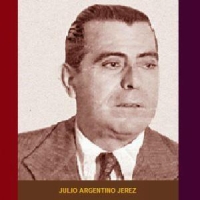
Guitarist, composer and poet. He was born on July 23, 1900 in Cúyoj, La Banda, Province of Santiago del Estero. In 1921 he accompanied his countryman Andrés Chazarreta to Buenos Aires with his Conjunto de Arte Nativo: both of them making the apology for the chacarera.
Kenji Wu
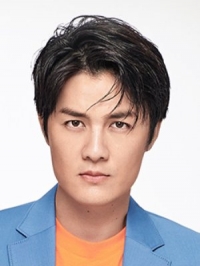
Kenji Wu (traditional Chinese: 吳克群; simplified Chinese: 吴克群; pinyin: Wú Kèqún; born 18 October 1979) is a Taiwanese singer-songwriter, actor and director.Wu was born on 18 October 1979 in Kaohsiung, Taiwan. When he was six, he moved to Argentina, but came back to Taiwan to compete in MTV Taiwan's "New Artist Fight Game".He attended the National Taiwan University of Arts majoring in theater.After competing in the "New Artist Fight Game" competition in 2000, he was subsequently signed to Virgin Music. Within half a year, Wu released his debut album Tomorrow, Alone (一個人的Tomorrow). Despite the involvement of top producers, the album received lukewarm response and weak sales. However, this gave him opportunities to act in Taiwanese drama such as Peach Girl and Moonlight Forest. During his time acting, he continued to perform songs he wrote and composed at pubs.
Philippe Bredif

Philippe Petit is a French high-wire artist who gained fame for his unauthorized high-wire walks between the towers of Notre Dame Cathedral in Paris in 1971 and of Sydney Harbour Bridge in 1973, as well as between the Twin Towers of the World Trade Center in New York City on the morning of 7 August 1974.
Emily Haines

Emily Savitri Haines is a Canadian singer and songwriter. She is the lead singer, keyboardist and songwriter of the rock band Metric and a member of Broken Social Scene. As a solo artist, she has performed under her own name and under the moniker Emily Haines & The Soft Skeleton.
Missy Higgins

Missy Higgins (born Melissa Morrison Higgins on August 19, 1983) is an award-winning Australian singer-songwriter, best known for the hit singles "Scar", "The Special Two" and "Steer". Her second album, On a Clear Night, was released in April 2007.
Sally DeFord

Sally DeFord Musical artist Born: 1959 (age 60 years), Eugene, Oregon, United States
Record labels: Defordmusic, Defordmusic.com, Sally DeFord Music, Sally DeFord
Genres: Alt Contemporary Christian, Christian/Gospel
Albums: He Is My Song, MORE
Record labels: Defordmusic, Defordmusic.com, Sally DeFord Music, Sally DeFord
Genres: Alt Contemporary Christian, Christian/Gospel
Albums: He Is My Song, MORE
Caro Emerald

Caroline Esmeralda van der Leeuw (born 26 April 1981), known by her stage name Caro Emerald, is a Dutch pop and jazz singer who mainly performs in English. Active since 2007, she rose to prominence in 2009 with her debut single, "Back It Up". Her follow-up single "A Night Like This" topped charts in the Netherlands. Emerald is often praised for her outstanding live performances.
Incubus

Incubus is a Grammy-nominated alternative rock band based out of Calabasas, California. Formed by vocalist Brandon Boyd, lead guitarist Michael Einziger, and drummer Jose Antonio Pasillas II while in high school, the band grew to include bassist Alex Katunich (a.k.a. "Dirk Lance"), and Gavin Koppell (a.k.a. "DJ Lyfe"), both of whom were eventually replaced by bassist Ben Kenney (formerly of The Roots), and DJ Kilmore, respectively.
They are known for their eclectic sound, balancing experimental and progressive qualities with pop appeal, earning praise for their ability to change and evolve their music with every subsequent release. Their lyrics touch on a number of different subjects, from their earliest works which touch on drugs and anti-conformity to the later albums where they often sing about politics and romance, although they primarily stress an optimistic view.
Incubus has received both high critical acclaim and commercial success, reaching multi-platinum sales, as well as releasing several highly successful singles. The band started branching out creatively and earned mainstream recognition with the release of their 1999 album Make Yourself. By 2001, Incubus became hugely successful with the single "Drive" and their follow up album Morning View. Their latest studio album, Light Grenades, has reached Gold certification and #1 in the U.S. Their music has also appeared in other media, such as the video games Halo 2 and Guitar Hero, and the films Stealth and Final Destination 2.
They are known for their eclectic sound, balancing experimental and progressive qualities with pop appeal, earning praise for their ability to change and evolve their music with every subsequent release. Their lyrics touch on a number of different subjects, from their earliest works which touch on drugs and anti-conformity to the later albums where they often sing about politics and romance, although they primarily stress an optimistic view.
Incubus has received both high critical acclaim and commercial success, reaching multi-platinum sales, as well as releasing several highly successful singles. The band started branching out creatively and earned mainstream recognition with the release of their 1999 album Make Yourself. By 2001, Incubus became hugely successful with the single "Drive" and their follow up album Morning View. Their latest studio album, Light Grenades, has reached Gold certification and #1 in the U.S. Their music has also appeared in other media, such as the video games Halo 2 and Guitar Hero, and the films Stealth and Final Destination 2.
Lara Fabian

Lara Fabian (born Lara Crokaert, January 9, 1970) is a Belgian-Italian international singer who holds Canadian citizenship. Multilingual, she sings in French, Italian and English. She has also sung in Spanish, Portuguese, Russian once in Hebrew on Israel's 60th Independence Day celebrations, and in German in 1988 for a version of "Croire" (ger.: "glauben" eng.: "believe"). She has sold over 18 million records worldwide.
The Cavaliers Drum and Bugle Corps

The Cavaliers Drum and Bugle Corps (also known as "The Green Machine") is a World Class competitive junior drum and bugle corps. Based in Rosemont, Illinois, The Cavaliers were one of the thirteen founding member corps of Drum Corps International and is a seven-time DCI World Champion. The Cavaliers are now the sole remaining all-male corps in an activity that once was predominantly made up of "all boy" groups.
Nicholas Hooper

Nicholas Hooper is a British film and television composer. He has scored the award-winning BBC productions Land of the Tiger and Andes to Amazon, as well as the TV movies The Girl in the Café and My Family and Other Animals among others
Travis Cottrell

Travis Cottrell is an American contemporary Christian music (CCM) artist, songwriter, author, and worship leader.
Cottrell was raised in Boone, North Carolina. In 1990, he moved to Nashville, Tennessee to study at Belmont University. After graduating in 1992 with a degree in music, Cottrell dedicated time to songwriting. That same year, he wrote Larnelle Harris' song "It's Only Thunder". He then worked with Kathie Hill on a musical titled Waiters: A Youth Musical About Waiting on the Lord. Cottrell then continued writing and working as an editor at a music publishing company.
Cottrell was raised in Boone, North Carolina. In 1990, he moved to Nashville, Tennessee to study at Belmont University. After graduating in 1992 with a degree in music, Cottrell dedicated time to songwriting. That same year, he wrote Larnelle Harris' song "It's Only Thunder". He then worked with Kathie Hill on a musical titled Waiters: A Youth Musical About Waiting on the Lord. Cottrell then continued writing and working as an editor at a music publishing company.
Joseph Gentry Stephens

Joseph Gentry Stephens, Choral Composer and Conudctor.
 Sheet Music Exchange is a web site for those who wants to access popular sheet music easily,
letting them download the sheet music for free for trial purposes.
It's completely free to download and try the listed sheet music, but you have to delete the files after 24 hours of trial period.
Don't forget, if you like the piece of music you have just learned playing,
treat the artist with respect, and go buy the original sheet music.
Sheet Music Exchange is a web site for those who wants to access popular sheet music easily,
letting them download the sheet music for free for trial purposes.
It's completely free to download and try the listed sheet music, but you have to delete the files after 24 hours of trial period.
Don't forget, if you like the piece of music you have just learned playing,
treat the artist with respect, and go buy the original sheet music.
